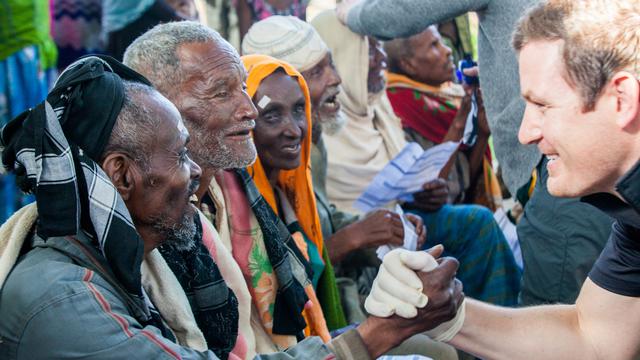Is the world getting worse? Some think our best days have passed; others think they’re just around the corner. But how do we know? By what criteria can we judge such a question? With limitless information at our fingertips, we can find stories and data to support either position. In one measurement or another, the world is always getting worse and always getting better — sometimes both at the same time. If we seek good news, we will find good; if we seek bad news, we will find bad. Perhaps the better question is, what kind of world do we choose to make?
It may not be possible to understand the world in its entirety. We all have our blind spots. But any attempt must balance bad news with good news. The daily drumbeat of tragedy, catastrophe, war, folly, corruption and suffering can spur us to action, but it can also hide the progress, cooperation, kindness, intelligence, trust and love that still flourish on our planet. A focus on the good helps us better judge the bad. We cannot see the goodness of neighbors and citizens through the dark lens of negativity.

Hope is realistic about the bad, but it chooses to deposit its money in the bank of the good. Pope Francis touched on this in his January 2017 address to communicators around the world, where he encouraged journalists to lift their sights higher than the smog of constant bad news.
“We have to break the vicious circle of anxiety and stem the spiral of fear resulting from a constant focus on ‘bad news,’” he said. “I ask everyone to offer the people of our time storylines that are at heart ‘good news.’”[1]
Some might consider this naïve, but it’s really an effort to paint a fuller picture, to find deeper truths.
In this vein, modern technology’s rapid evolution is a mixed blessing. An increasingly connected world democratizes knowledge and encourages broader awareness and deeper understanding. But technological tools are also used to confuse, depress and destroy. The Atlantic's November 2016 cover story, for example, spends 10,000 words on how social media is being weaponized across the world. [2]
While some use technology as a weapon, many others use it as a tool to speak of good things, hopeful things, redeeming things. Mormon apostle Elder David A. Bednar, for example, invited Latter-day Saints worldwide in 2014 to “sweep the earth” with authentic and uplifting messages. Since then, The Church of Jesus Christ of Latter-day Saints has provided several opportunities for its members to talk about and share good news.
In 2015, the Church produced a gritty yet hopeful video series about the real struggles and triumphs of those going through addiction recovery. In 2016, many Mormons responded to a Church call to reach out to refugees in their communities. Later that year, Latter-day Saints and others responded to a Christmas-themed invitation to “light the world” through simple acts of service—both during Christmas and throughout the year.
Individuals of other faiths also let their light shine. For example, a July 2016 profile in the New Yorker focuses on one Christian woman’s quest to answer God’s call to be a hospice nurse. Heather Meyerend says she chose that vocation because she wanted to “care for the whole person” — a desire rooted in her belief that “God had created bodies for a reason and that they mattered a lot.”[3]
Another example comes from a February 2017 Los Angeles Times profile of Mohamed Bzeek, a Muslim foster parent in Los Angeles County who takes in terminally ill children. He currently cares for an immobile 6-year-old foster girl who is blind and deaf and has daily seizures. Though challenging, Bzeek says, “I always talk to her. I’m always holding her, playing with her. … She has feelings. She has a soul. She’s a human being.” The key, he says, is to love her and others he cares for as if they were his own children. “I know they are sick. I know they are going to die. I do my best as a human being and leave the rest to God.”[4]
Such quiet one-on-one ministry happens every day by unseen multitudes who quietly live for God without need of acclaim. Acts of goodness should never be done for recognition, but knowing about them can breathe fresh air into the mind of a public jaded by unceasing headlines of violence, partisanship and poverty.
Though these examples come from people of faith, one need not be religious to reach out or recognize the remarkable goodness of our age. New York Times columnist Nicholas Kristof recently wrote that despite negative headlines, 2017 may be the “best year ever” thanks to important technological advances to improve health and eradicate extreme poverty.
“What’s infinitely more important [than bad news],” Kristof writes, “is that [every day] some 18,000 children who in the past would have died of simple diseases will survive, about 300,000 people will gain electricity and a cool 250,000 will graduate from extreme poverty.”[5]
In a world awash with information, the good as well as the bad help us see “things as they really are” and as they can be.[6] We are not helpless creatures before the forces of negativity. We are actors. We shape society by the information we choose to accentuate. Hope begets hope. The world doesn’t have to get worse. It can get better.
[1] In Josephine McKenna, “Pope Francis Calls on Media to End ‘Constant Focus on Bad News,’” Religion News Service, Jan. 24, 2017, http://religionnews.com/2017/01/24/pope-francis-calls-on-media-to-end-constant-focus-on-bad-news/.
[2] See “War Goes Viral,” The Atlantic, Nov. 2016, https://www.theatlantic.com/magazine/archive/2016/11/war-goes-viral/501125/.
[3] In Larissa MacFarquhar, “A Tender Hand in the Presence of Death,” The New Yorker, July 11 and 18, 2016, http://www.newyorker.com/magazine/2016/07/11/the-work-of-a-hospice-nurse.
[4] In Hailey Branson-Potts, “‘I Know They Are Going to Die’: This Foster Father Takes in Only Terminally Ill Children,” Los Angeles Times, Feb. 8, 2017, http://www.latimes.com/local/lanow/la-me-ln-foster-father-sick-children-2017-story.html.
[5] “Why 2017 May Be the Best Year Ever,” New York Times, Jan. 21, 2017, https://mobile.nytimes.com/2017/01/21/opinion/sunday/why-2017-may-be-the-best-year-ever.html.
[6] Jacob 4:13.